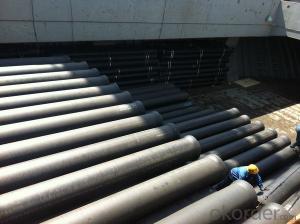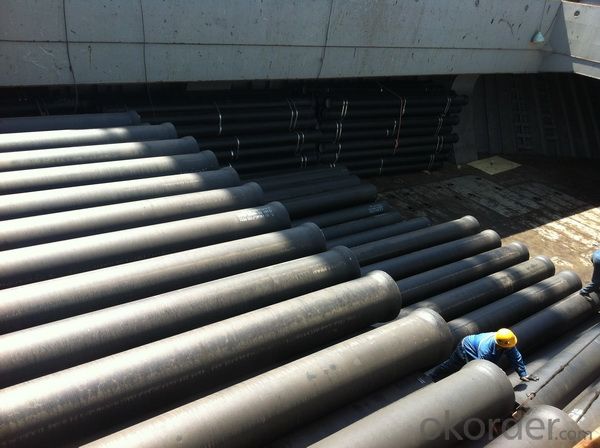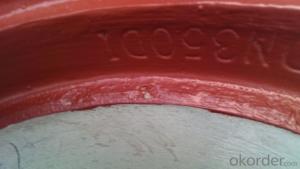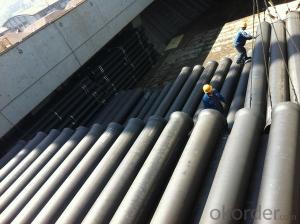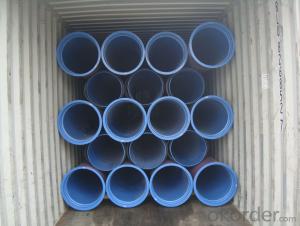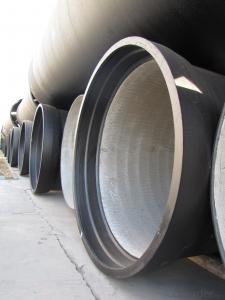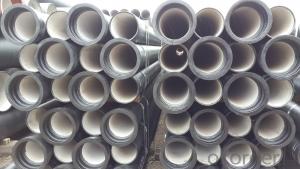T Type Ductile Iron Pipe DN1400 socket spigot pipe
- Loading Port:
- Tianjin
- Payment Terms:
- TT OR LC
- Min Order Qty:
- 200
- Supply Capability:
- 80000 /month
OKorder Service Pledge
OKorder Financial Service
You Might Also Like
1) The standard of pipe: ISO2531:1998, EN545:2006,K9 K8
2) Effective length: 6m/5.7m
3) Inner cement line: Portland cement lineas per ISO4179
4) Zinc coating: at least 130g/m2 as per ISO8179
5) Bitumen painting: at least 70μm as per ISO8179
6)With 102% quantity of NBR, SBR, or EPDM ring asper ISO4633
7) DN80-DN1200
8) Highstrength, lighter than grey iron, good corrosion resistance, no furring, smallflow resistance, easy fixing, long life tome about 100 yeas
9)Checked by automatic inspection equipment
10) Composition:
Chemical composition | |||
Chemical composition | Ductile Cast Iron Pipe (%) | Grey iron pipe (%) | Steel pipe (%) |
C | 3.5-4.0 | 3.2-3.8 | 0.1-0.2 |
Si | 1.9-2.6 | 1.4-2.2 | 0.15-0.4 |
Mn | 0.15-0.45 | 0.4-0.6 | 0.3-0.6 |
P | ≤0.06 | ≤0.3 | 0.02-0.03 |
S | ≤0.02 | ≤0.1 | 0.02-0.03 |
Mg | 0.03-0.06 |
|
|
11) Feature:
Mechanical properties | |||
| Ductile Cast Iron Pipe | Grey Iron Pipe | Steel Pipe |
Tensile Strength(Mpa) | ≥420 | 150-260 | ≥400 |
Yield Strength(Mpa) | ≥300 | No Confirmation | No Confirmation |
Bending Strength(Mpa) | ≥590 | 200-360 | ≥400 |
Elongation (%) | ≥10 | Neglected | ≥18 |
Brinell Hardness(HBS) | ≤230 | ≤230 | About 140 |
12) T type mechanical joint
13) Packing: in bulk or container
PACKING: 1) Pipesare bundled together with the steel belt.
2) Wooden pieces are put between the pipes.
- Q: Can ductile iron pipes be used for underground fuel storage systems?
- No, ductile iron pipes are not suitable for underground fuel storage systems. They are more commonly used for water and sewer applications due to their strength and durability in carrying liquids. Underground fuel storage systems require materials that are specifically designed to handle the corrosive nature of fuel and prevent leaks or contamination, such as double-walled fiberglass or steel tanks.
- Q: What are the differences between ductile cast iron pipes and centrifugal ductile iron pipes?
- Small, thin pipe fittings are usually rolled or continuously cast, and large, thick pipes are usually centrifugally cast. Compared to sand casting, the tissue is compact and homogeneous.
- Q: Are ductile iron pipes suitable for industrial water systems?
- Ductile iron pipes, well-known for their strength, durability, and resistance to corrosion, are a perfect choice for industrial water systems. With the capability to withstand high-pressure and heavy-duty applications, these pipes are ideal for transporting water in large-scale industrial facilities like power plants, factories, and chemical plants. Moreover, ductile iron pipes can handle a broad range of temperatures, making them suitable for both hot and cold water systems. Their inherent flexibility allows for easy installation and maintenance, enhancing their suitability for industrial water systems. In conclusion, ductile iron pipes offer a dependable and economical solution for industrial water transportation requirements.
- Q: Can ductile iron pipes be used for underground fire hydrant systems?
- Yes, ductile iron pipes can be used for underground fire hydrant systems. Ductile iron pipes are known for their strength and durability, making them suitable for underground applications. They have excellent resistance to corrosion and can withstand high pressures, which are essential requirements for fire hydrant systems. Additionally, ductile iron pipes have a long service life, reducing the need for frequent replacements and maintenance, making them a cost-effective choice for fire hydrant systems.
- Q: Can ductile iron pipes be used for slurry transportation?
- Yes, ductile iron pipes can be used for slurry transportation. Ductile iron pipes are known for their strength and durability, which makes them suitable for transporting various types of fluids, including slurry. They have the ability to withstand the abrasive nature of slurry and can effectively handle the pressure and flow requirements associated with slurry transportation.
- Q: Can ductile iron pipes be used for underground geothermal systems?
- Indeed, underground geothermal systems can utilize ductile iron pipes. Renowned for their robustness, endurance, and immunity to corrosion, these pipes are apt for myriad purposes, encompassing underground geothermal systems. They possess the capacity to withstand elevated temperatures and pressures, rendering them optimal for conveying scorching geothermal fluids. Moreover, ductile iron pipes boast a protracted lifespan and the ability to endure the soil shifts and strains inherent in subterranean installations. Consequently, they represent a dependable selection for underground geothermal systems.
- Q: There are several forms of flexible interfaces for Spigot Cast Iron Pipes
- Socket type cast iron pipe rigid interface antiallergic can, under the action of external force, no tower water supply equipment interface packing easy fragmentation and leakage, especially in the weak foundation and uneven subsidence area and the earthquake zone. The interface damage rate is higher. Therefore, flexible interfaces should be adopted under the above unfavorable conditions.
- Q: Can ductile iron pipes be used for underground sewage systems?
- Yes, ductile iron pipes can be used for underground sewage systems. Ductile iron is a type of cast iron that has enhanced flexibility and strength, making it suitable for various applications, including sewage systems. Ductile iron pipes offer several advantages for underground sewage systems. Firstly, they have excellent corrosion resistance, which is crucial in sewage systems where the presence of moisture and chemicals can cause corrosion over time. This resistance to corrosion ensures the long-term durability and reliability of the pipes. Secondly, ductile iron pipes have high tensile strength, allowing them to withstand the pressure and stress that can occur in underground sewage systems. They are resistant to ground movements, such as soil settling or shifting, which can cause damage to other types of pipes. Furthermore, ductile iron pipes have a smooth internal surface, which results in a better flow capacity and reduces the likelihood of clogging or blockages in the sewage system. This smooth surface also helps to minimize the accumulation of debris and sediment, reducing the need for frequent maintenance and cleaning. Another important factor is that ductile iron pipes are available in various sizes and can easily be connected using a range of joint systems, allowing for flexibility in designing and constructing underground sewage systems. In summary, ductile iron pipes are an excellent choice for underground sewage systems due to their corrosion resistance, high tensile strength, smooth internal surface, and ease of installation.
- Q: Are ductile iron pipes suitable for wastewater pumping stations?
- Ductile iron pipes are well-suited for pumping stations that handle wastewater. This material is known for its strength and durability, making it capable of withstanding the tough and corrosive properties of wastewater. It boasts exceptional resistance against wear, corrosion, and impact, which makes it a dependable choice for wastewater applications. Moreover, ductile iron pipes possess a high tensile strength and can handle high-pressure situations, thus proving their suitability for pumping stations that transport wastewater across long distances or elevated areas. The smooth inner surface of ductile iron pipes also aids in reducing friction, promoting the smooth flow of wastewater and minimizing the risk of blockages. In conclusion, ductile iron pipes offer a cost-effective and durable solution for wastewater pumping stations.
- Q: How can the ductile iron pipe be welded?
- The nickel electrode cold welding, such as Z408
Send your message to us
T Type Ductile Iron Pipe DN1400 socket spigot pipe
- Loading Port:
- Tianjin
- Payment Terms:
- TT OR LC
- Min Order Qty:
- 200
- Supply Capability:
- 80000 /month
OKorder Service Pledge
OKorder Financial Service
Similar products
Hot products
Hot Searches
Related keywords
